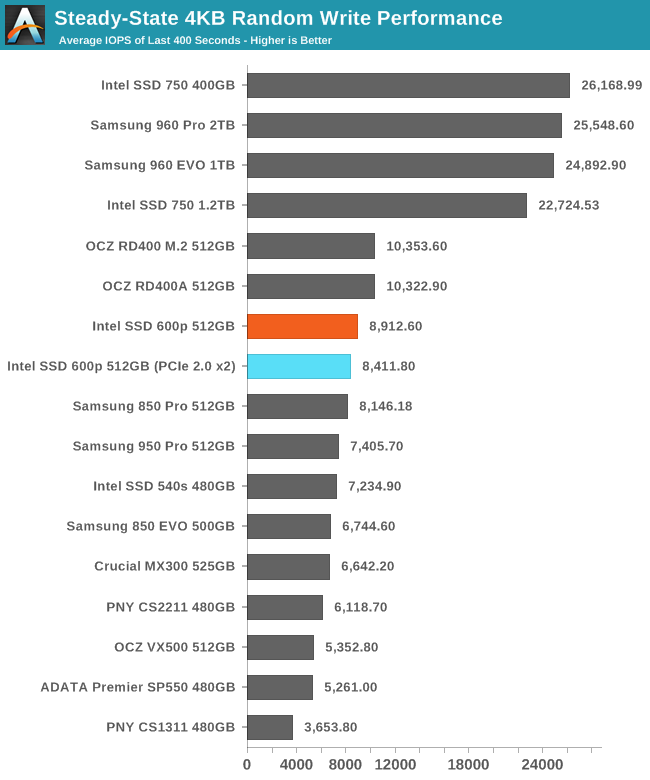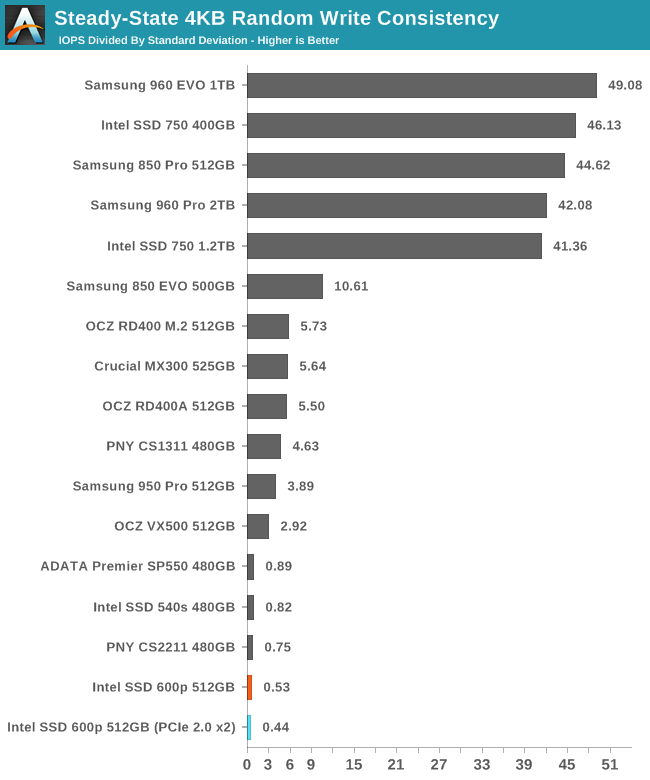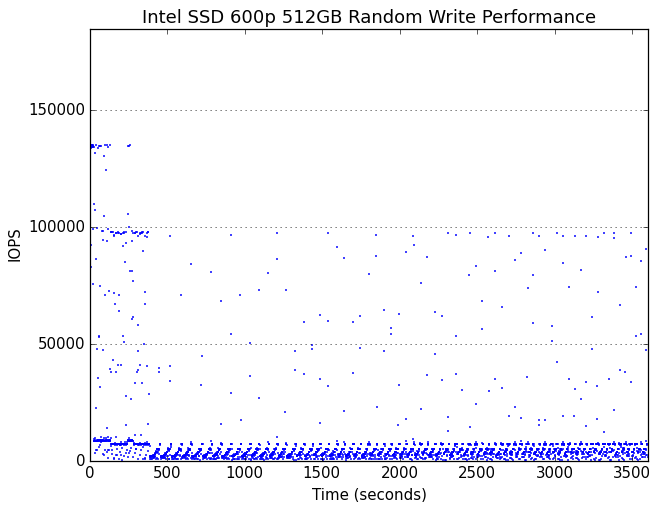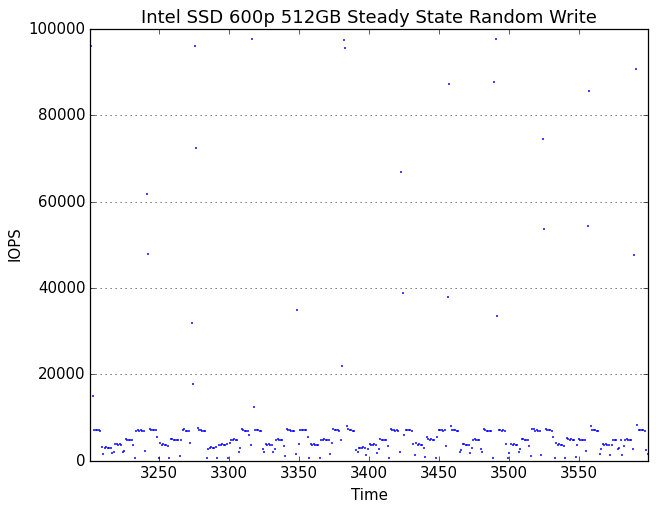The Intel SSD 600p (512GB) Review
by Billy Tallis on November 22, 2016 10:30 AM ESTPerformance Consistency
Our performance consistency test explores the extent to which a drive can reliably sustain performance during a long-duration random write test. Specifications for consumer drives typically list peak performance numbers only attainable in ideal conditions. The performance in a worst-case scenario can be drastically different as over the course of a long test drives can run out of spare area, have to start performing garbage collection, and sometimes even reach power or thermal limits.
In addition to an overall decline in performance, a long test can show patterns in how performance varies on shorter timescales. Some drives will exhibit very little variance in performance from second to second, while others will show massive drops in performance during each garbage collection cycle but otherwise maintain good performance, and others show constantly wide variance. If a drive periodically slows to hard drive levels of performance, it may feel slow to use even if its overall average performance is very high.
To maximally stress the drive's controller and force it to perform garbage collection and wear leveling, this test conducts 4kB random writes with a queue depth of 32. The drive is filled before the start of the test, and the test duration is one hour. Any spare area will be exhausted early in the test and by the end of the hour even the largest drives with the most overprovisioning will have reached a steady state. We use the last 400 seconds of the test to score the drive both on steady-state average writes per second and on its performance divided by the standard deviation.

The Intel 600p's steady state random write performance is reasonably fast, especially for a TLC SSD. The 600p is faster than all of the SATA SSDs in this collection. The Intel 750 and Samsung 960s are in an entirely different league, but the OCZ RD400 is only slightly ahead of the 600p.

Despite a decently high average performance, the 600p has a very low consistency score, indicating that even after reaching steady state, the performance varies widely and the average does not tell the whole story.
 |
|||||||||
| Default | |||||||||
| 25% Over-Provisioning | |||||||||
Very early in the test, the 600p begins showing cyclic drops in performance due to garbage collection. Several minutes into the hour-long test, the drive runs out of spare area and reaches steady state.
 |
|||||||||
| Default | |||||||||
| 25% Over-Provisioning | |||||||||
In its steady state, the 600p spends most of the time tracing out a sawtooth curve of performance that has a reasonable average but is constantly dropping down to very low performance levels. Oddly, there are also brief moments of unhindered performance where the drive spikes to exceptionally high performance of up to 100k IOPS, but these are short and infrequent enough to have little impact on the average performance. It would appear that the 600p occasionally frees up some SLC cache, which then immediately gets used up and kicks off another round of garbage collection.
With extra overprovisioning, the 600p's garbage collection cycles don't drag performance down as far, making the periodicity less obvious.










63 Comments
View All Comments
Billy Tallis - Thursday, November 24, 2016 - link
They're in Bench now.Flying Aardvark - Friday, November 25, 2016 - link
I have the 1TB 600P and love it. I bought it knowing full well it wasn't a benchmark king. Don't care, low QD performance has hardly improved for quite some time. But at the price, for a 5-year warranty with 0.3% failure rate per year was a no brainer over the 960 EVO for me.I can't get it to slow down or stutter in my case and if you can, you should probably step all the way up to the Intel 750, heatsink intact and all.
crazyowl - Sunday, November 27, 2016 - link
I'm not sure now to formulate this correctly so as not to hurt the reputation of the product, but there's been a report of a 600p burning a motherboard's traces when installed via a DeLonghi adapter card. Anandtech, what could you comment on that issue? Came across it in a review for the 600p at a respectable decent online shop.crazyowl - Sunday, November 27, 2016 - link
Sorry, it was DeLock, not DeLonghi. The latter seems to be a houseware brand.Billy Tallis - Sunday, November 27, 2016 - link
Our testing showed the 600p to be relatively power hungry by the standards of M.2 PCIe SSDs, but it most certainly wasn't drawing enough current to be a danger to any equipment that is capable of safely powering other M.2 PCIe SSDs. Whatever you read about was likely the result of either a manufacturing defect in the board that was supplying power to the M.2 drive, or the result of improper installation leading to a short circuit. I've killed a motherboard through the latter means, but it was only due to the modifications I've made to facilitate measuring PCIe card power consumption.Xajel - Monday, November 28, 2016 - link
I would love to have an NVMe SSD, sadly my system is old (ASUS P8Z77 ) so, it's not able to boot from NVMe.. although nothing is wrong with the chipset it can do it, but ASUS never released any BIOS update, there's some unofficial mod's which can enable this but there's no guarantee it will work or it will brick.el-loc0 - Monday, November 28, 2016 - link
@Anandtec: what equipment do you use to measure power consumption?Billy Tallis - Tuesday, November 29, 2016 - link
For PCIe SSDs, I use a riser card from Adex Electronics with current sense resistors on the 3.3V and 12V supply lines. For SATA SSDs, I use a multimeter spliced into the power cable to measure current directly.el-loc0 - Tuesday, November 29, 2016 - link
Thanks for quick reply, Billy. Do PCIe SSD Draw Power from both lines, 3.3 V and 12 V? Do you use a current clamp or how do you measure on the riser card? Which multimeter do you use?SanX - Thursday, December 1, 2016 - link
Did Intel pay for this BS review?